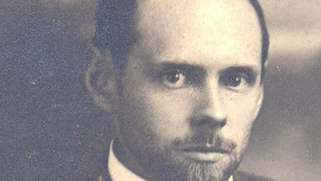On January 29, 2021, five invited participants discussed their contributed essays drawing on their work on the political economy of risk and uncertainty, or what political theorists could learn from Knight. Essays presented at the symposium were published in the 2021 edition of the research annual "Research in the History of Economic Thought & Methodology."
In 1921, Houghton Mifflin published Frank H. Knight's "Risk, Uncertainty and Profit" under the terms of the Hart, Schaffner and Marx essay competition, in which Knight's dissertation had won second place back in 1917. Forty years later, the American Economic Association awarded Knight the Walker medal, awarded once every five years to honor the American economist who "made the greatest contribution to economics" throughout his career. "Risk, Uncertainty and Profit" was the foundation for that award, although Knight contributed much more.
At the center of Knight's book was a reformulation of classical price theory designed to set up the discipline for consideration of the contribution of price theory to the modern world of imperfect competition. The most important difference, Knight argued, between classical price theory and imperfect competition was the presence in the latter of uncertainty, which emerged from dynamic, and hence unpredictable, change. It was dynamic unpredictability that created the economic conditions for entrepreneurial action, and also for the formation of the corporation, in which ownership and management were separated in order (so they hoped) to reduce the firm's exposure to uncertainty. Both of these modern contexts required judgment, a human faculty uncalled for in perfect competition, where it was all calculation because everything was predictable. Uncertainty required judgment, not only about situations, but also about the capacity of others to make judgments in uncertain situations. Organization, therefore, emerged, both within firms and in social economic organization, as a means of coordinating judgments.
"Risk, Uncertainty and Profit" leaves us with the question of how (or perhaps, whether) our new social, economic and political organizations will maintain, in the presence of imperfect competition, what Philip Wicksteed once called "the immediate accomplishment of each other's purposes in order to secure the ultimate accomplishment of [our] own, irrespective of what those purposes of [our] own may be."
Agenda is tentative and subject to change.
Times are in local AZ MST (UTC-7).
Friday, January 29
7:45 a.m.— Introduction
8:00 a.m. — Session 1
- Per Bylund, Oklahoma State University
- Ali Khan, Johns Hopkins University with Edward Schlee, Arizona State University, and Aniruddha Ghosh, Johns Hopkins University
9:00 a.m. — Break
9:30 a.m. — Session 2
- Ross Emmett, Arizona State University
- Roni Hirsch, Harvard University
10:30 a.m. — Break
11:00 a.m. — Session 3
- Richard Wagner, George Mason University
11:30 a.m. — Conclusion Conversation on RUP
Noon — End
Why are you hosting the RUP Symposium virtually rather than in-person?
Due to the uncertainty of COVID-19 and for the safety of all attendees and students, we determined it was best to host a virtual symposium via Zoom rather than canceling.
Who can attend the RUP Symposium?
The symposium free and open to the general public.
Do I have to register to attend?
Yes, registration is required in order to receive your personal link via email to join the webinar. This also allows us to have an accurate headcount for an improved attendee experience at this and future events.
Do I need to download Zoom?
The web browser client will download automatically when you start or join your first Zoom meeting, and is also available for manual download here.
For more information about Zoom and system requirements, you can visit the Zoom Help Center.
Do I need an account to use Zoom?
You do not have to have a Zoom account to attend a Zoom meeting or webinar. You will be prompted to download the software, once you have clicked on the link that you have been provided via email after registering to attend the symposium. You may also wish to create an account, but that is not required to participate in a Zoom webinar.
Will the sessions be recorded?
No. To keep the registration process as smooth and unencumbered as possible, we are not asking anyone to sign an ASU Photo/Recording Release form prior to attending
Will the papers being presented at the sessions be available before the symposium starts?
Yes, papers by the presenters will be distributed prior to the symposium start so attendees have an opportunity to read and get familiar with the topic prior to the sessions. Only those registered for the conference will receive a link to all the papers prior.
How long are sessions?
Each session will be 60 minutes long. Each presenter in each session will have 20 minutes to present and roughly 10 minutes for Q/A from the audience.
What time zone is Arizona?
Phoenix, Arizona is MST (UTC-7). You can use this simple time zone converter to convert your time zone with the local conference time.
Are there sponsorship opportunities?
Yes, please email [email protected].
I have more questions!
For any additional questions, email [email protected].
Thank you for your interest in the RUP Symposium.
Registration is required to attend and participate in the conference.
If you have any questions, please email [email protected]
